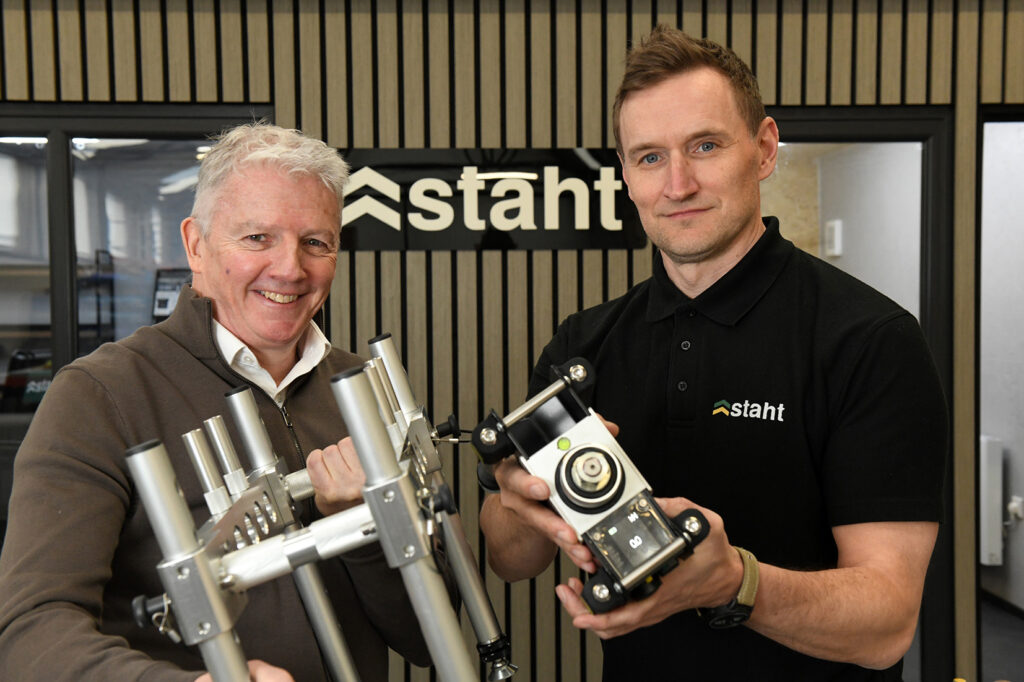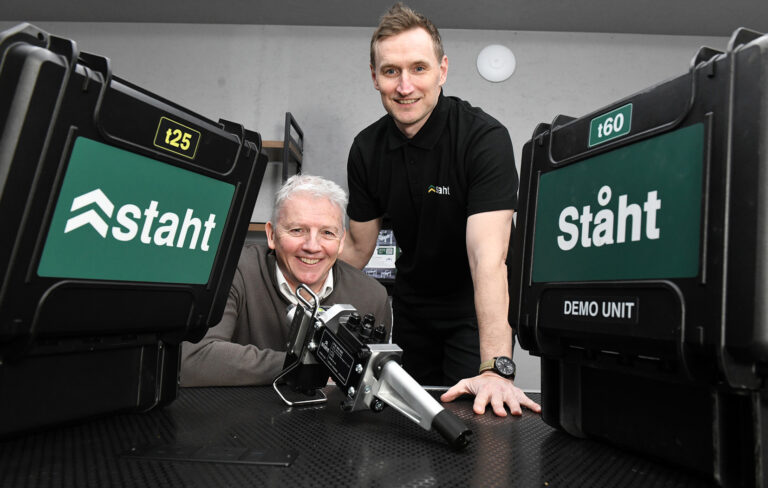 The technology aims to streamline compliance checks, particularly where detailed inspection records are required for site safety documentation or third-party verification.
To meet increased demand, the company has recently expanded its operations at Hayes Lane Trading Estate in Lye, adding new warehouse and workshop space along with a training facility for clients.
Staht has also received support from Business Growth West Midlands (BGWM), a government-funded service aimed at helping small businesses scale up. Through BGWM, the firm secured capital funding for a 3D printer, allowing it to bring product prototyping in-house.
BGWM adviser Steve Dunn said Staht was an example of a small manufacturer responding to the construction sector’s evolving needs.
“Rob and the team are designing and building equipment in the Black Country that’s being used around the world. It’s a good case of innovation meeting market demand — especially in areas like scaffolding where inspection regimes are tightening.”
Staht currently employs six people and is continuing to develop new tools aimed at the access and safety market. Its most recent product, the T25, offers Bluetooth connectivity and a full-colour screen in a more compact format.
The technology aims to streamline compliance checks, particularly where detailed inspection records are required for site safety documentation or third-party verification.
To meet increased demand, the company has recently expanded its operations at Hayes Lane Trading Estate in Lye, adding new warehouse and workshop space along with a training facility for clients.
Staht has also received support from Business Growth West Midlands (BGWM), a government-funded service aimed at helping small businesses scale up. Through BGWM, the firm secured capital funding for a 3D printer, allowing it to bring product prototyping in-house.
BGWM adviser Steve Dunn said Staht was an example of a small manufacturer responding to the construction sector’s evolving needs.
“Rob and the team are designing and building equipment in the Black Country that’s being used around the world. It’s a good case of innovation meeting market demand — especially in areas like scaffolding where inspection regimes are tightening.”
Staht currently employs six people and is continuing to develop new tools aimed at the access and safety market. Its most recent product, the T25, offers Bluetooth connectivity and a full-colour screen in a more compact format. Scaffold Testing Tech Maker Staht Sets £1m Goal
 The technology aims to streamline compliance checks, particularly where detailed inspection records are required for site safety documentation or third-party verification.
To meet increased demand, the company has recently expanded its operations at Hayes Lane Trading Estate in Lye, adding new warehouse and workshop space along with a training facility for clients.
Staht has also received support from Business Growth West Midlands (BGWM), a government-funded service aimed at helping small businesses scale up. Through BGWM, the firm secured capital funding for a 3D printer, allowing it to bring product prototyping in-house.
BGWM adviser Steve Dunn said Staht was an example of a small manufacturer responding to the construction sector’s evolving needs.
“Rob and the team are designing and building equipment in the Black Country that’s being used around the world. It’s a good case of innovation meeting market demand — especially in areas like scaffolding where inspection regimes are tightening.”
Staht currently employs six people and is continuing to develop new tools aimed at the access and safety market. Its most recent product, the T25, offers Bluetooth connectivity and a full-colour screen in a more compact format.
The technology aims to streamline compliance checks, particularly where detailed inspection records are required for site safety documentation or third-party verification.
To meet increased demand, the company has recently expanded its operations at Hayes Lane Trading Estate in Lye, adding new warehouse and workshop space along with a training facility for clients.
Staht has also received support from Business Growth West Midlands (BGWM), a government-funded service aimed at helping small businesses scale up. Through BGWM, the firm secured capital funding for a 3D printer, allowing it to bring product prototyping in-house.
BGWM adviser Steve Dunn said Staht was an example of a small manufacturer responding to the construction sector’s evolving needs.
“Rob and the team are designing and building equipment in the Black Country that’s being used around the world. It’s a good case of innovation meeting market demand — especially in areas like scaffolding where inspection regimes are tightening.”
Staht currently employs six people and is continuing to develop new tools aimed at the access and safety market. Its most recent product, the T25, offers Bluetooth connectivity and a full-colour screen in a more compact format. Stork Secures Major Inspection Contract with Ithaca Energy
UK Team Secures Final Spot in ScaffChamp 2025
Scaffmag can exclusively reveal that Lancashire-based AK Scaffolding Ltd has claimed the last coveted spot in ScaffChamp 2025, the international scaffolding championship set to take place next month.
The announcement marks a significant moment for the competition, as AK Scaffolding becomes the final team to join the elite global lineup competing in what is widely regarded as the world’s premier scaffold assembly showdown.
Sources close to the event organisers have confirmed that AK Scaffolding Ltd has officially accepted the invitation to represent the UK on the global stage. Their participation ensures Britain will once again have a presence in the high-pressure, time-critical event that tests speed, accuracy, and safety in scaffold erection and dismantling.
ScaffChamp, held in Vilnius, Lithuania, will feature teams from across Europe and beyond, all vying for top honours in front of an international audience. The competition is as much a celebration of craft and teamwork as it is a battle of skill and efficiency.
With the lineup now complete, anticipation for ScaffChamp 2025 has reached new heights.
More details, including team profiles and competition format, will follow soon.
Scaffolder Dies After Fall at Hong Kong Site Despite Wearing Safety Harness
Star Scaffolding’s Mark Chard Shortlisted for Top Business Award
Scaffolding Association Launches First in New Guidance Series
The Scaffolding Association has released the first in a new series of guidance documents, designed to elevate safety standards and reinforce professional practices throughout the scaffolding industry.
Focusing on scaffold inspections, the guidance sets out best practice procedures to ensure the safety, compliance, and structural integrity of scaffolding on sites nationwide. It comes as part of the Association’s broader mission to raise standards and promote safer working environments across the industry.
The new publication, which is free to access, is designed to be a practical tool for scaffolding professionals, offering clear and accessible advice to support internal safety initiatives such as toolbox talks, training schemes, and client engagement. Robert Candy, Chief Executive of the Scaffolding Association, said the guidance was part of the organisation’s ongoing efforts to support its members and the wider sector.
Acrow Expands Industrial Access Division with Strategic Acquisitions in NSW
High-Profile Clients and Complex Projects
Brand Australia, previously owned by global industrial services giant BrandSafway, has a strong foothold in the power generation and resources sectors, with operations centred around the Hunter Valley and a small presence in Gladstone. Above Scaffolding, meanwhile, has built a reputation for engineering high-end access solutions for infrastructure, defence, and industrial clients. Above’s clients include Transport for NSW, Thales, and Sydney Water, with ongoing work on the Sydney Harbour Bridge expected to drive revenue growth over the next two years. “These are iconic projects and demonstrate the technical capability and reputation of Above Scaffolding,” said Mr Boland. “Together, these acquisitions are not only a strong cultural fit for Acrow, but they also present a range of integration and growth opportunities.”Financial Impact and Outlook
The two new businesses are expected to bring in around $40 million in revenue and at least $6 million in profit by the 2026 financial year. Acrow says the acquisitions were made at a good value and will be paid for using its existing loan facility with Westpac. The company also said that some of its projects have been delayed, affecting its 2025 results. However, it remains confident about the future, with many promising projects in the pipeline. Both acquisitions are set to be completed and take effect from 1 May 2025.About the Businesses
Brand Australia will be acquired through a share sale agreement, with Acrow securing all local assets and operations. A transitional services agreement will ensure a smooth integration, with continued access to the BrandSafway name during the transition. Above Scaffolding, established in 1995, brings with it a legacy of complex engineering and access expertise, leveraging systems such as Layher and Skyclimber. Its project portfolio includes the Sydney Opera House and the Barangaroo precinct. “This is a significant milestone for Acrow,” Mr Boland added. “We welcome the teams from Brand Australia and Above Scaffolding into the Acrow family as we move forward into an exciting new chapter of growth.”Scaffolding Excellence Awards 2025 Open for Entries
- Project of the Year (Small, Medium, Large, and Major)
- Service of the Year
- Product of the Year (sponsored by Stepup Scaffold UK)
- Scaffold Design of the Year (sponsored by Worldwide Scaffold and Access)
- Apprentice of the Year (sponsored by CISRS)
- Lifetime Achievement Award
Three Workers Killed at Texas LNG Terminal
Three workers have died following a tank jump form system collapse at a liquefied natural gas (LNG) terminal under construction in Port Arthur, Texas. The incident occurred in the early hours of Tuesday morning at the site of Sempra’s Port Arthur LNG export facility, approximately 90 miles east of Houston. According to authorities, the tank jump form system gave way around 2:00 am local time while workers were operating near the top of a concrete LNG containment tank. Three men fell several storeys and suffered fatal injuries. Two additional workers were injured and temporarily stranded but have since been treated and released from hospital. Local media have identified the deceased as Felipe Mendez, 25; Felix Lopez, 42; and Dontrell Magee, 41. Magee was reportedly alive when emergency responders arrived but died later in hospital, according to Jefferson County officials. The prime contractor for the site, engineering giant Bechtel, has suspended all operations at the facility while it conducts an internal review. In a statement, the company described the event as a “tank jump form system incident” and said it was cooperating fully with investigating authorities. “We are heartbroken by the loss of our colleagues,” the statement read. “We have paused work at the site and are focusing on supporting the families and our workforce.” Images from the scene show a partial section of the circular tank jump form system still hanging from the containment structure, indicating a failure along one side.
 Construction on the $13 billion Port Arthur LNG terminal began in 2023. The project is set to be one of the largest of its kind in the U.S., with Phase 1 expected to include two liquefaction trains and an annual export capacity of 13 million tonnes.
The facility is strategically located on the Sabine-Neches Ship Channel, near Golden Pass and Sabine Pass LNG terminals.
Port Arthur LNG’s output is fully contracted under long-term agreements with energy companies, including ConocoPhillips, RWE, PKN Orlen, INEOS, and Engie. Completion of the first phase is projected for 2027 or 2028, with thousands of workers currently involved in its construction
The U.S. Occupational Safety and Health Administration (OSHA) is expected to launch a formal investigation into the collapse.
Construction on the $13 billion Port Arthur LNG terminal began in 2023. The project is set to be one of the largest of its kind in the U.S., with Phase 1 expected to include two liquefaction trains and an annual export capacity of 13 million tonnes.
The facility is strategically located on the Sabine-Neches Ship Channel, near Golden Pass and Sabine Pass LNG terminals.
Port Arthur LNG’s output is fully contracted under long-term agreements with energy companies, including ConocoPhillips, RWE, PKN Orlen, INEOS, and Engie. Completion of the first phase is projected for 2027 or 2028, with thousands of workers currently involved in its construction
The U.S. Occupational Safety and Health Administration (OSHA) is expected to launch a formal investigation into the collapse. Manchester Scaffolding Firm Launches Knife Crime Awareness Campaign
 Mr Smith added: “If it makes even one person stop and think, it’s worth every bit of effort.”
The company plans to expand the campaign across the majority of its scaffolds situated in high-traffic areas over the coming weeks and is encouraging other firms in the industry to get involved.
“Let’s build futures, not fear,” Mr Smith said. “Manchester, let’s make a change.”
Mr Smith added: “If it makes even one person stop and think, it’s worth every bit of effort.”
The company plans to expand the campaign across the majority of its scaffolds situated in high-traffic areas over the coming weeks and is encouraging other firms in the industry to get involved.
“Let’s build futures, not fear,” Mr Smith said. “Manchester, let’s make a change.” 










